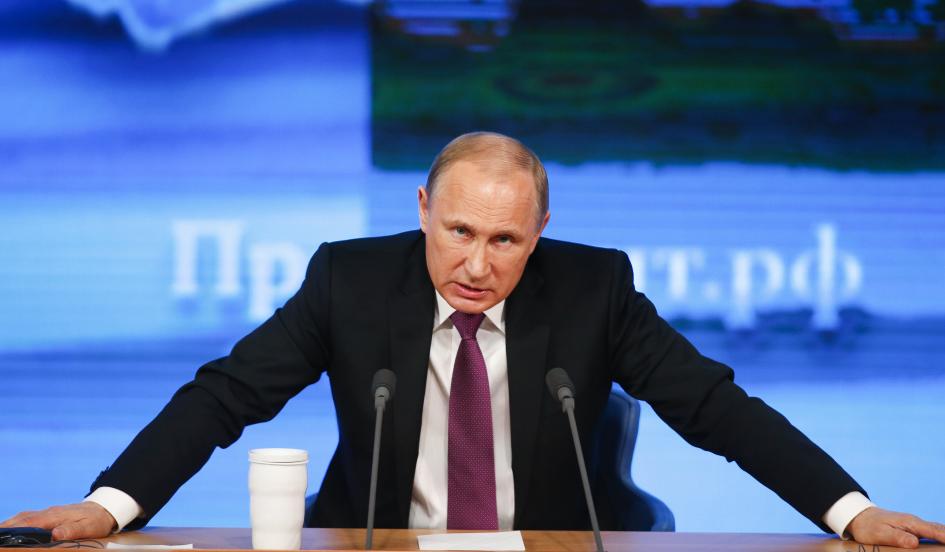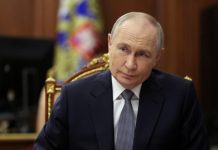
When the Berlin Wall fell, the Western world stopped thinking about how to explain and promote its political system in Russia and around the world. Neither offense nor defense, it seemed, was necessary any more.
The Soviet bloc’s long-standing use of propaganda and disinformation was in disrepute even at home. Soviet leader Mikhail Gorbachev himself joked at a press conference that there was no need to answer a question from the BBC “because you know everything already.”
Journalists in Russia and other ex-Communist countries scrambled to copy Western media models. In the post-Soviet world, the Western media were no longer the hyenas of bourgeois nationalism but the epitome of fairness, decency and truth. Western journalists happily concurred.
But the golden age of post-Communist media was over almost before it began. In countries such as Belarus and the republics of ex-Soviet central Asia, the authorities simply took over all of the media that mattered. In Russia, pluralism survived for a decade, although corruption and proprietorial interference first tainted and then obliterated the ideals of the early 1990s.
Vladimir Putin perhaps rightly objected to oligarchic control of the media. But his solution—bringing all mainstream media under the control of the state, or its cronies, made things worse not better.
None of that troubled the outside world, any more than Putin’s onslaught on the Russian constitution or his capture of the commanding heights of the Russian economy. Nor did most Westerners worry about the fragility of the media in the nations of what we used to call Eastern Europe.
Lacking a strong commercial base, much of the media in countries such as Poland, the Czech Republic and the Baltic states began to suffer from the same commercial pressures and cynicism that affected their counterparts in the former Soviet Union.
Even while this was happening, the idea that the Putin regime could wage an effective propaganda war against the West aroused incredulity, among both policymakers and media professionals. What could the Kremlin conceivably say that would make an impact among seasoned Western media consumers or even less seasoned Central Europeans? Why would anyone even listen to state-sponsored foreign propaganda channels, let alone believe what they broadcast?
The first part of the answer to that is in just two letters: RT. Initially mocked for its clumsy pro-Kremlin line, the station once known as Russia Today has morphed into a sophisticated, multilingual channel that focuses not on eulogizing the Putin regime but in decrying the West. Its motto is “Question more,” though a more accurate version would add the words “except where Russia is concerned.”
RT looks on the surface like any other television channel. Its presenters speak English and the other languages it broadcasts in (such as German) flawlessly. The content is a lively mix of scandal and polemic.
Taken individually, most RT items would not look out of place on Western television: Scare stories about disease outbreaks and disasters; “exposés” of hypocrisy, corruption and abuse of power; and terrifyingly negative reports about the prospects for the world economy.
But RT is highly selective. It reports scandals but not the efforts made to deal with them. It omits in its coverage the most essential feature of Western democracies: contestability.
Things go wrong all the time, but in the Western system of government you have a chance to put them right. You can complain to your elected representatives, sue the people who have wronged you (including the government), launch public campaigns, set up pressure groups, fulminate in the media and, if necessary, use the electoral system to make your case.
Of course the Western system isn’t perfect, but it does contain checks and balances, independent courts and elected officials. None of these things exist in Putin’s Russia.
By systematically highlighting the woes of the West and ignoring the far greater shortcomings at home, RT helps spread the idea that Western criticism of Russia is selective and unfair. It strenuously promotes the idea that truth is relative and facts are elastic.
But RT is only one small part of Russia’s disinformation empire. The second pillar is the system of “troll factories,” memorably exposed in a recent New York Times article.
On September 11 last year, hundreds of Twitter accounts began “reporting” news of a major chemical explosion in St. Mary Parish, Louisiana. Nothing of the kind had occurred, but the abundance of “eyewitness” reports gave the accident a War of the Worlds-like credibility. As the Times reported
“A powerful explosion heard from miles away happened at a chemical plant in Centerville, Louisiana #ColumbianChemicals,” a man named Jon Merritt tweeted. The #ColumbianChemicals hashtag was full of eyewitness accounts of the horror in Centerville. @AnnRussela shared an image of flames engulfing the plant. @Ksarah12 posted a video of surveillance footage from a local gas station, capturing the flash of the explosion. Others shared a video in which thick black smoke rose in the distance.
This was not an elaborate prank. It was a carefully planned exercise involving cloned websites, spurious text messages, a faked YouTube video, doctored screen shots and hundreds of social media accounts run by the Kremlin’s “trolls.” Other hoaxes, involving an Ebola outbreak and a police shooting, followed in subsequent weeks.
Of course these were one-off stunts, but they prove that the Kremlin is building its capabilities in this sphere, practicing for bigger tasks.
This kind of disinformation is already a central part of what military analysts call “hybrid war”—the use of nonmilitary means to erode the adversary’s willpower, confuse and constrain his decision making and undermine his public support, so that victory can be attained without a shot being fired. This is how Russia operated in Ukraine. Now it is trying it on the West, both in the front-line states of central Europe as well as the supposedly impregnable countries of Western Europe and North America.
So far, the fake stories, fake websites and bogus “experts” are a fringe phenomenon in larger Western countries. But in smaller countries where the media are weak and easily manipulated, they are already beginning to help shape public opinion and change the outcome of elections.
The current Czech president was elected with the help of Russian money—it came directly from Lukoil, a Russian company—as well as pro-Russian websites. In Bulgaria, a Russian oligarch is attempting to purchase a major television station. Even in France, Russian financial support for Marine Le Pen’s far-right National Front party is part of a concerted effort to change the outcome of elections in a major European country.
Belatedly, Western governments are beginning to come to grips with this. NATO has a center of excellence for “strategic communications” (i.e., information warfare) in Riga, the Latvian capital. NATO’s own communication efforts in Brussels have finally acquired a much sharper edge, with punchy infographics blasting Russian “myths” about Western encirclement.
Britain has revived its military propaganda efforts with a new unit, the 77th Brigade, comprising 1,500 soldiers with expertise in social media. The United States is beefing up its vestigial Soviet-era efforts against disinformation within the State Department.
But these efforts are tiny in the face of what is only going to become a greater challenge with time, not only from Russia but from China, Iran and others that seek to take advantage of the West’s open media space in order to manipulate Western public opinion.
In a world where social media can become a weapon of disinformation and journalists can be hoodwinked by phony “experts,” we need new methods not just of combating disinformation but of identifying it, explaining it and understanding how it works. In the coming months, the Center for European Policy Analysis hopes to begin this long process.
By Anne Applebaum, , for Newsweek
Anne Applebaum is a senior adjunct fellow at the Center for European Policy Analysis, where she co-leads a major initiative aimed at countering Russian disinformation in Central and Eastern Europe. Edward Lucas is a senior vice president at CEPA and energy, commodities and natural resources editor at The Economist.





